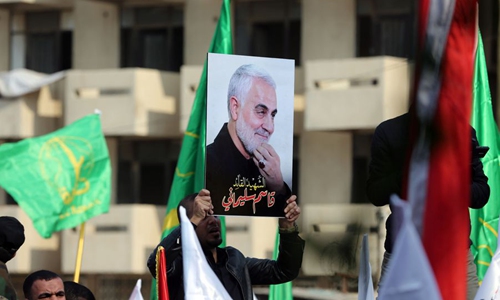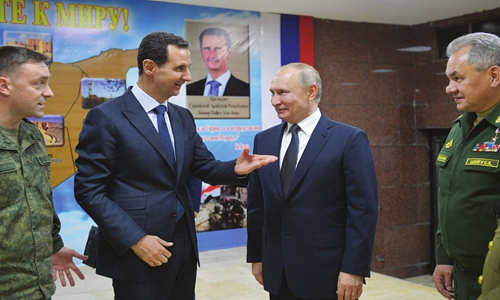HOME >> CHINA
Iran shows calm in attacks
By Yang Sheng and Liu Xuanzun Source:Global Times Published: 2020/1/9 0:13:40
Tehran’s purpose is ‘to force US troops to leave Iraq’

A group of mourners holding pictures of top Iranian commander Qasem Soleimani in Baghdad, Iraq on Saturday. Photo: Xinhua
Iran's missile strikes, which targeted US military bases in Iraq to retaliate against the US assassination of Iranian military commander Qasem Soleimani, could have led to further instability, but war was never the purpose of the two sides, and Tehran's goal was to force US troops to leave Iraq, Chinese experts said.
Although the military actions drew attention worldwide and led to fears of war, Chinese experts said the strikes showed Iran's calm and caution, and they argued a war between the US and Iran won't bring another "period of strategic opportunity" to China as it could affect the China-proposed Belt and Road Initiative and the energy import from the region.
Iran's Islamic Revolution Guards Corps (IRGC) targeted the US airbase of Ain al-Assad in Anbar province in western Iraq on Wednesday in response to the US assassination of Soleimani, Iranian official news agency Islamic Republic News Agency (IRNA) reported.
Iranian state television claimed that at least 80 "American terrorists" were killed in attacks involving 15 Fateh 313 missiles on US targets in Iraq, adding that none of the missiles were intercepted.
State TV, citing a senior Revolutionary Guards source, also said Iran had 100 other targets in the region in its sights if Washington takes any retaliatory measures. It also said US helicopters and military equipment were "severely damaged."
US President Donald Trump said at a press conference at 11:30 am Wednesday local time in Washington that "No Americans were harmed" in the missile attacks by Iran.
Of the 15 missiles Iran fired into Iraq, 10 hit the Ain al-Asad Air Base, one hit a military base in Erbil and four failed to hit their targets, according to a US military spokesman for Central Command, responsible for US forces in the Middle East, Fox News reported on Wednesday.
The US made no effort to intercept the missiles, the Los Angeles Times reported, citing a US defense official who was not authorized to speak on record, while the US-based Military Times reported that a source with direct knowledge of events on the ground says that three incoming missiles were knocked down by Patriot batteries.
Song Zhongping, a military expert and TV commentator, told the Global Times that the US has limited antiballistic missile capability in Iraq, as only tactical, short-range antiballistic missile weapons are deployed since the US has relatively less military equipment there.
The US' air defense capability is questionable in the first place, Song said, remembering Saudi Arabia's failure to protect its oil installations using US air defense systems from drone attacks in September 2019.
During the Gulf War, the US claimed that the Patriot had a 90 percent interception rate on Soviet-made Scud ballistic missiles, but the actual success rate was no more than 10 percent, Song said.
Iran's semi-official Fars News Agency reported that the missiles were probably of the Fateh 313 type and were launched from Iran's western Kermanshah province.
Fateh 313 missiles are road-mobile, single-stage, solid-fueled surface-to-surface missiles with a range of 500 kilometers, the Xinhua News Agency reported.
Xu Guangyu, a senior adviser to the China Arms Control and Disarmament Association, told the Global Times on Wednesday that Iran was very restrained in the attacks.
Iran has no intention to launch an all-out war with the US over the death of Soleimani, and the international community is also asking both sides to remain restrained, Xu said, noting that Iran probably believes the Trump administration does not want a major war either, so it crafted these restrained attacks.
Hua Liming, a former Chinese ambassador to Iran, told the Global Times that "Iran must respond because of fury among its own people, and the missile strike was the most visible and high-profile measure, and more importantly, the IRGC can control the scale of strikes to prevent overreaction."
If the IRGC doesn't do anything, the Iran-controlled or pro-Iran militia groups in Iraq, Yemen, Lebanon and Syria might launch their own actions, such as lone wolf attacks and assassinations, and this could be dangerous and might force the US to deploy more troops in the region, and even attack Iran, Hua said.
Iranian Ambassador to China Mohammad Keshavarzzadeh also told the Global Times that lone wolf attacks are not an option as the "military actions are powerful enough."
"So the strikes showed Iran was calm and cautious. It's trying to find a way to retaliate to satisfy its people, and something the US can tolerate," Hua said.
Iranian Foreign Minister Javad Zarif said on Twitter on Wednesday that "Iran took proportionate measures in self-defense under Article 51 of UN Charter targeting a base from which a cowardly armed attack against our citizens and senior officials was launched. We do not seek an escalation or war, but will defend ourselves against any aggression."

Russian President Vladimir Putin (second from right) listens to Syrian President Bashar al-Assad (second from left) who visited the headquarters of the Russian forces in the Syrian capital Damascus on Tuesday. Putin met his Syrian counterpart during an unprecedented visit to Damascus as the prospect of war between Iran and the US loomed over the region. Photo: AFP
China and Russia
Chinese Foreign Ministry spokesperson Geng Shuang said at Wednesday's routine press conference that China is concerned about the current sensitive and complicated situation and urged relevant parties to stay restrained.
On Chinese social media, some web users believe that a war between Iran and the US could ease US pressure against China and could bring another period of strategic opportunity to China, just like 9/11 in 2001 that made the US spend a lot in the Middle East and allowed years for China to develop.
Jin Canrong, associate dean of Renmin University of China's School of International Studies in Beijing, said that this kind of thinking was not mature, because if the Middle East falls into chaos and even war, the China-proposed Belt and Road Initiative and energy imports from the region would be affected, despite a reduction in US military pressure on China in East Asia.
The US elites want to shift their focus from the Middle East to China and Russia, but its allies in the region like Israel and Saudi Arabia want the US to stay to help them contain Iran, Jin noted.
Russian President Vladimir Putin landed in Damascus on Tuesday for a surprise visit to Syria, amid regional concerns over a possible war between the US and Iran, Russia Today reported. This is the first visit by Putin to the Syrian capital since the war broke out in 2011. His motorcade drove to the Russian expeditionary force's command center, where he met Syrian President Bashar Assad.
Chinese experts noted the appearance of Putin in Syria at this juncture showed that Russia wants to tell the countries in this region Russia's presence and its ally's security have not been affected while the US is in trouble, and Russia could play a more important role while the region suffers from chaos.
Following his visit to Damascus, Putin traveled to Turkey, where he is scheduled to attend the opening ceremony of the 'Turk Stream' gas pipeline with his Turkish counterpart Recep Tayyip Erdogan. He is also scheduled to discuss with Erdogan the security situation in Syria and Libya, where Turkey has just sent troops, Russia Today reported.
All-out war
In terms of military strength, the US has an overwhelming advantage over Iran in terms of both strategic and tactical weapons, as well as aerial, land and naval power, Xu said.
However, Iran possesses a large number of missiles deployed near its borders, giving the country the capability to control key sea lanes in the Hormuz Strait and Persian Gulf, as it can even hit Israel, Xu said.
Iran operates the largest missile arsenal in the Middle East, with thousands of short- and medium-range ballistic and cruise missiles capable of striking as far as Israel and southeast Europe, according to US think tank Center for Strategic & International Studies.
If an all-out war breaks out, Iran will not gain much, but the US will also suffer heavy losses, Xu said.
Xu pointed out that both Iran and the US have, to date, only attacked outside of their countries, so should Trump decide to take further military action, they are more likely to aim at Iran's forces overseas.
The current situation is a significant test for both Iranian and US leaders, Hua said. "If the US launches another strike to hit Iran and causes serious damages, then Iran is unable to keep cautious and restraint and the possibility of an all-out war cannot be ruled out."
Using the moral high ground, the sympathy worldwide and its influence in Iraq to force US troops to leave Iraq is much more important than killing US personnel and seeking revenge through military actions, Hua said.
Supreme Leader of the Islamic Revolution Ayatollah Ali Khamenei said from Tehran on Wednesday that the corruptive presence of the US in the region must end, the IRNA reported on Wednesday. Referring to the attack, Khamenei said, "Last night's action was merely a slap, but the US must leave the region."
Hua said it is unrealistic to expect the US to leave the Middle East because the region is highly significant for the country's global hegemony, but forcing the US to leave Iraq is possible as the Iraqi parliament also called foreign military forces to leave the country, so Iran will have legitimacy.
Posted in: DIPLOMACY